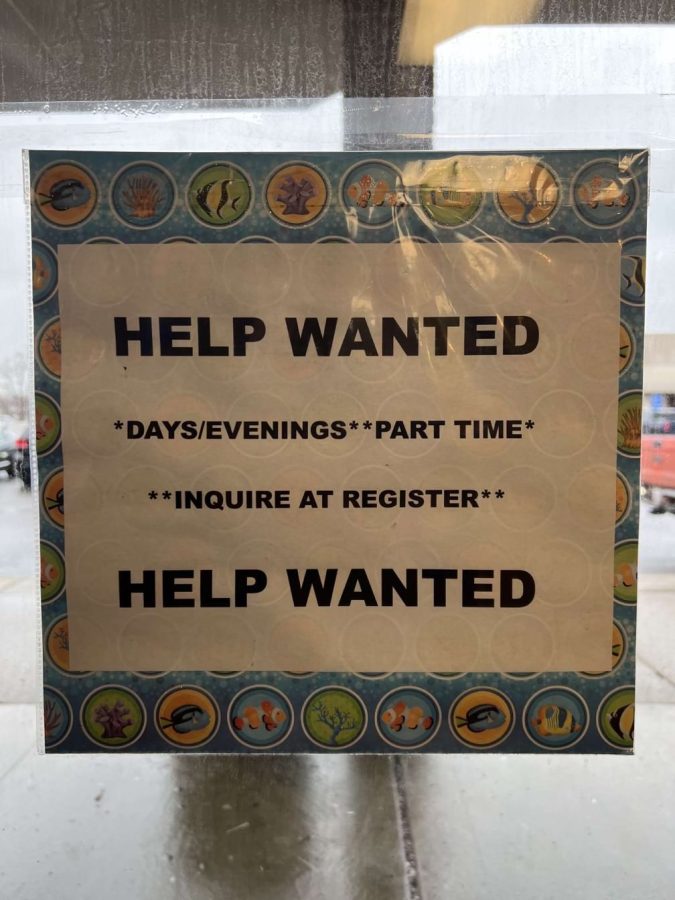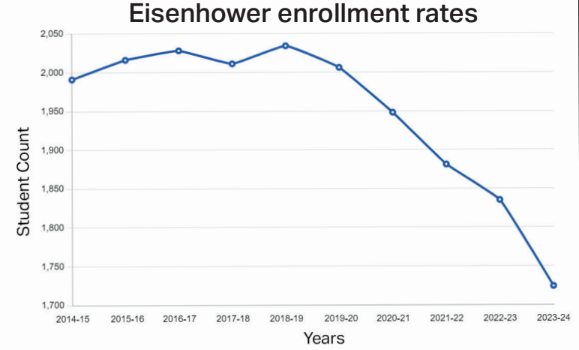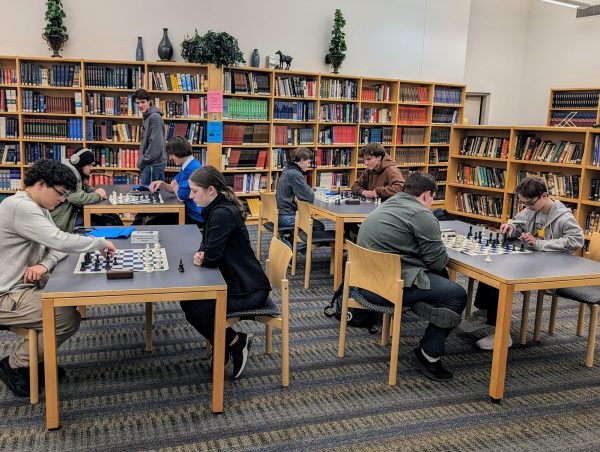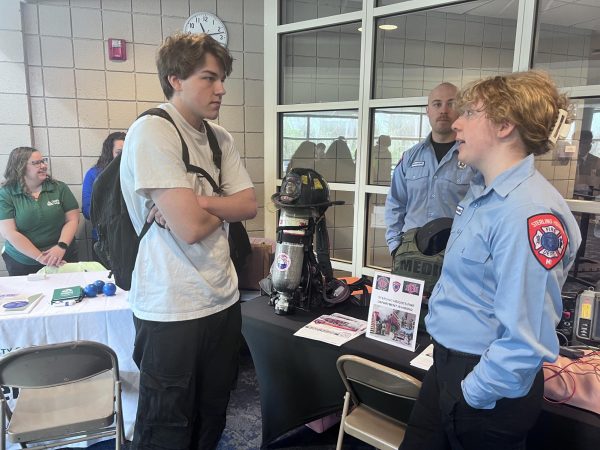Understaffed, under pressure
National worker shortage affects students in their day to day life
Getting called in to work at the last minute, working too much and lack of workers is the new norm as the national worker shortage continues. It’s impacting everyone, including teens.
Prior to the pandemic, the unemployment rate was 3.5 percent of the population, with 5.7 million people unemployed. As of Jan. 2022, it rose to 4 percent with 6.5 million people unemployed, according to the Bureau of Labor Statistics. Since 10.9 percent of teens hold jobs, according to statista.com, this shortfall weighs heavy on their shoulders.
“Overall, the business needs more workers. I have to put in a lot more work because when we’re understaffed, I have to take on more tasks such as taking on more tables or staying after longer to help clean up,” senior Isabella Pacitto said. “When I have to work late nights I don’t have as much time to focus on school. It’s hard to balance between the two when I’m working a lot of shifts and also getting a lot of homework.”
As a result of the worker shortage, student employees are often tasked with more hours than prior to the pandemic and afforded responsibilities adults, such as a manager or owner, would normally handle.
“A lot of times we do not have enough people to close, so I end up having to stay longer. I end up getting out very, very late and it can be really frustrating sometimes,” senior Evan Shallow said.
With “we’re hiring” signs plastered in store windows and the majority of businesses hiring most positions, desperate times call for desperate measures as more and more teens are hired and job expectations increase. The number of working teens is at its highest since 2008, according to the Bureau of Labor Statistics. Those teens fill positions meant for adults with more experience.
“Sometimes when I’m done with my part of the closing shift, I have to do other peoples’ tasks because we don’t have enough staff. Specifically, I will have to mop their part of the store or I have to do their task, like cleaning the grill, doing the dishes or taking out the trash,” Shallow said. “It gets annoying because I’m not there to do their job, I’m there for my job.”
For many businesses teens are the solution to filling vacancies. Businesses also gain financially from hiring teenagers because they can pay them lower wages.
The minimum wage for minors 17 years and younger is 85 percent of state minimum wage, according to the Department of Licensing and Regulatory Affairs (LARA). For example, Michigan’s minimum wage, as of Jan. 2021, is $9.87 per hour; 85 percent of that equates to $8.39 an hour for a teen’s wage. Tipped employees, like restaurant servers, must be paid at least 38 percent of minimum wage, which equals roughly $3.75. So while adults are cashing in on higher wage opportunities businesses are offering, not all teens are given the same opportunity..
“My son’s friend, I think he is 15, and right now they are paying him minimum wage, but as soon as he turns 16, they are going to up his rate,” business teacher Louise LaFaive said.
By hiring younger workers, businesses are only required to pay them minimum wage and due to child labor laws, students are only allowed to work limited hours, meaning they can hire multiple teens and save money.
Today, businesses also benefit from hiring Gen Z students because they look at the world with a different perspective than older generations, according to American Express.
“As a teenager, I think that I bring fresh ideas into my job. It’s better for problems and situations to be looked at from a different perspective for different solutions,” senior Wilson Riggs said.
Employing high school students can provide them the chance to gain occupational skills and employment skills. This may include skills such as communication, teamwork, problem solving, deadline and time management skills .
“I have gained many skills from working at Qdoba, like how to cook rice and grill foods such as chicken and steak. I have also developed many social skills by taking people’s orders and running the cash register,” senior Jacob Razook said.
Although there are a variety of benefits to having a job as a high school student, working longer hours cuts into time for students, which is typically spent doing homework, playing sports, attending club events, hanging out with friends, catching up on sleep and more.
“Sometimes, because when I have to close or work later shifts, I have less time to do my homework when I get home. I will usually have to stay up later to get everything done which means I get a lot less sleep,” Shallow said.
A student’s mental health can take a toll if they become too stressed out at work, according to counselor Amy Chappelle.
“I think the goal would be to find a job that they enjoy. And not all work is fun all the time, but I don’t think anybody wants to work a job where they feel stressed all the time or aren’t enjoying it. So I think if a student is feeling stressed at work, it definitely is going to impact their mental health,” Chappelle said. “Meet with your counselor, talk about what it is that’s stressing you out about the job and decide if maybe a different job would be better. Sometimes, making a change like that is not a sign of failure; it’s a sign of learning more about yourself and knowing what you want to do to have better balance in your life, more satisfying mental health and you can still make money in a job that you hopefully enjoy a little bit more.”
When feeling this way, it can be hard on the mind and body, making one more vulnerable to physical and mental health issues, according to Mental Health America (MHA) National. While stress is inevitable, and not necessarily bad, there are healthy ways to deal with it.
Going for a walk, calling a friend, or even something as simple as taking a shower can help relieve stress, according to MHA National. It is important to take a step back and take care of oneself when overwhelmed.
“I think every kid is different and would be overwhelmed for different reasons,” Chappelle said. “If they ever are struggling, they can always talk to their counselor here at school. I’ve had students actually talk with me when they were feeling overwhelmed at work. And when I talked with them about pinpointing what it was like if they don’t have enough time for homework, we would talk about trying to work only on the weekends. That way their work days are reserved for homework time or socialization time. So sometimes we can kind of help pinpoint what it is that they’re struggling with.”
Another factor of the national worker shortage affects students in a different way– albeit indirectly: the economy. With fewer workers, economic growth of businesses slows down, which has an effect on economic growth, according to economics teacher Kevin Donahue.
“If we don’t solve the problem, our economy grows at a slower rate and we have a smaller pie to divide in the future. So a smaller pie means everyone gets a smaller slice of pie,” Donahue said.
Long term effects of the worker shortage are unknown as it depends on how long it takes to solve the problem, according to Donahue. Historically, fertility rates would need to be increased and after 18 years those born would fill the need; or immediately hire more immigrants to fill existing jobs, he added.
“It’s too bad that we haven’t found a way to solve the problem. There’s lots of business owners who could be having more economic success, but the reality is that you have an economic situation and you have a political situation. And sometimes those two don’t go well together to allow for a solution,” Donahue said.
The worker shortage has effects on the community around the school. As a result, some stores went out of business and due to the low number of workers, some restaurants or other businesses have to close on certain days of the week to give it’s workers a break, according to LaFaive.
“Restaurants are closed on Sundays or on Mondays now because they’re got to give their people who they do have time off. They’re just shortening all those hours,” LaFaive said. “Let’s say you need 20 people, but you only have 10. Then the only way that you’re going to cover everything is if you shorten your hours because you’re not going to be able to open all those shifts. If not, it’s going to have to be management that’s going to have to cover it. You just can’t because you get too tired.”
School district’s and UCS itself are affected by the shortage, with some teachers having to give up their prep-hour to make up for the shortage of substitutes. Those teachers who have a prep-hour are often asked to sub for other classes. There is also a shortage of bus drivers, according to LaFaive, which was widely advertised on news sites.
In order to recover, the positions left open by the worker shortage need to be filled or alternative measures need to take place to meet the needs of a growing population.
“People have to apply for the jobs in order for those jobs to be filled in order for them to go back to normal,” LaFaive said, “but this may be the new normal.”
Your donation will support the student journalists of Eisenhower High School. Your contribution will allow us to purchase equipment and cover our annual website hosting costs.






![Dance the night away. After winning first place for both the jazz and pom category, junior Aubrey Bowen celebrates her win with the junior varsity team. “She [Bowen] loves the team, and involves herself in lots of team bonding events,” Bowen’s Mom, Mellisa Mulville-Bowen said. Occasionally, Bowen hosted the teams bonding events and offered anything possible for her teams success.](https://ikenews.com/wp-content/uploads/2023/11/IMG_8502-450x600.jpg)









